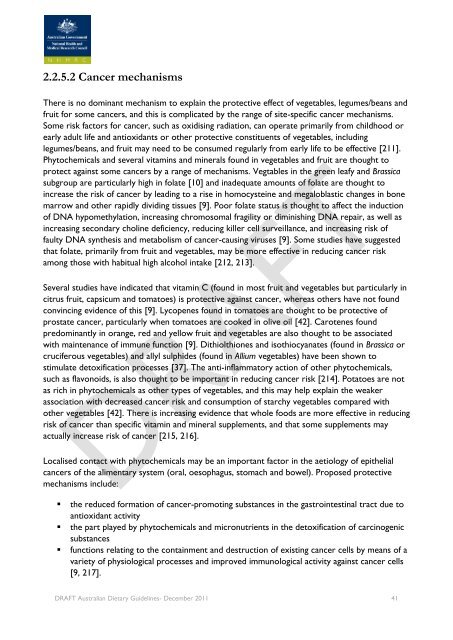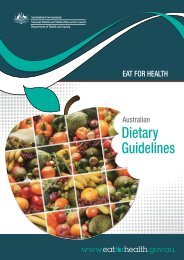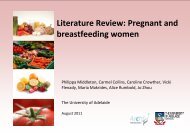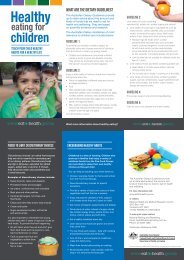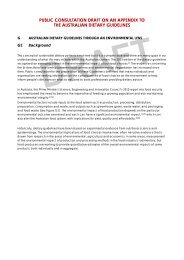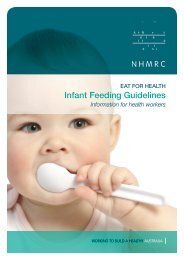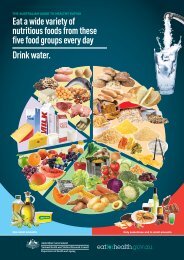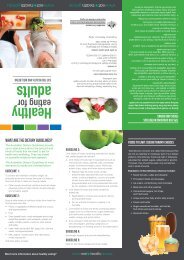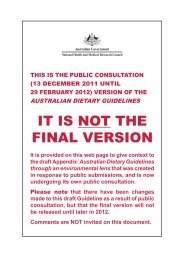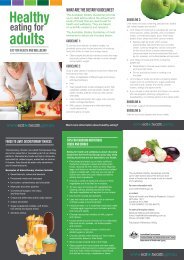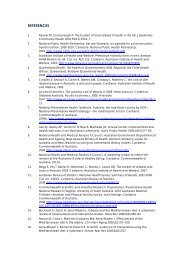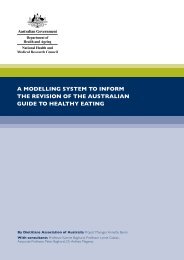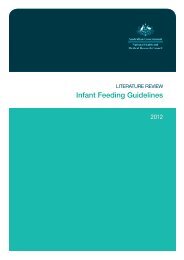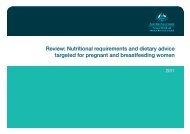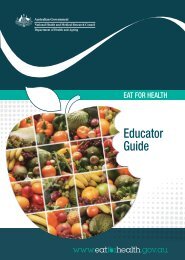DRAFT Australian Dietary Guidelines - Eat For Health
DRAFT Australian Dietary Guidelines - Eat For Health
DRAFT Australian Dietary Guidelines - Eat For Health
Create successful ePaper yourself
Turn your PDF publications into a flip-book with our unique Google optimized e-Paper software.
2.2.5.2 Cancer mechanisms<br />
There is no dominant mechanism to explain the protective effect of vegetables, legumes/beans and<br />
fruit for some cancers, and this is complicated by the range of site-specific cancer mechanisms.<br />
Some risk factors for cancer, such as oxidising radiation, can operate primarily from childhood or<br />
early adult life and antioxidants or other protective constituents of vegetables, including<br />
legumes/beans, and fruit may need to be consumed regularly from early life to be effective [211].<br />
Phytochemicals and several vitamins and minerals found in vegetables and fruit are thought to<br />
protect against some cancers by a range of mechanisms. Vegtables in the green leafy and Brassica<br />
subgroup are particularly high in folate [10] and inadequate amounts of folate are thought to<br />
increase the risk of cancer by leading to a rise in homocysteine and megaloblastic changes in bone<br />
marrow and other rapidly dividing tissues [9]. Poor folate status is thought to affect the induction<br />
of DNA hypomethylation, increasing chromosomal fragility or diminishing DNA repair, as well as<br />
increasing secondary choline deficiency, reducing killer cell surveillance, and increasing risk of<br />
faulty DNA synthesis and metabolism of cancer-causing viruses [9]. Some studies have suggested<br />
that folate, primarily from fruit and vegetables, may be more effective in reducing cancer risk<br />
among those with habitual high alcohol intake [212, 213].<br />
Several studies have indicated that vitamin C (found in most fruit and vegetables but particularly in<br />
citrus fruit, capsicum and tomatoes) is protective against cancer, whereas others have not found<br />
convincing evidence of this [9]. Lycopenes found in tomatoes are thought to be protective of<br />
prostate cancer, particularly when tomatoes are cooked in olive oil [42]. Carotenes found<br />
predominantly in orange, red and yellow fruit and vegetables are also thought to be associated<br />
with maintenance of immune function [9]. Dithiolthiones and isothiocyanates (found in Brassica or<br />
cruciferous vegetables) and allyl sulphides (found in Allium vegetables) have been shown to<br />
stimulate detoxification processes [37]. The anti-inflammatory action of other phytochemicals,<br />
such as flavonoids, is also thought to be important in reducing cancer risk [214]. Potatoes are not<br />
as rich in phytochemicals as other types of vegetables, and this may help explain the weaker<br />
association with decreased cancer risk and consumption of starchy vegetables compared with<br />
other vegetables [42]. There is increasing evidence that whole foods are more effective in reducing<br />
risk of cancer than specific vitamin and mineral supplements, and that some supplements may<br />
actually increase risk of cancer [215, 216].<br />
Localised contact with phytochemicals may be an important factor in the aetiology of epithelial<br />
cancers of the alimentary system (oral, oesophagus, stomach and bowel). Proposed protective<br />
mechanisms include:<br />
the reduced formation of cancer-promoting substances in the gastrointestinal tract due to<br />
antioxidant activity<br />
the part played by phytochemicals and micronutrients in the detoxification of carcinogenic<br />
substances<br />
functions relating to the containment and destruction of existing cancer cells by means of a<br />
variety of physiological processes and improved immunological activity against cancer cells<br />
[9, 217].<br />
<strong>DRAFT</strong> <strong>Australian</strong> <strong>Dietary</strong> <strong>Guidelines</strong>- December 2011 41


